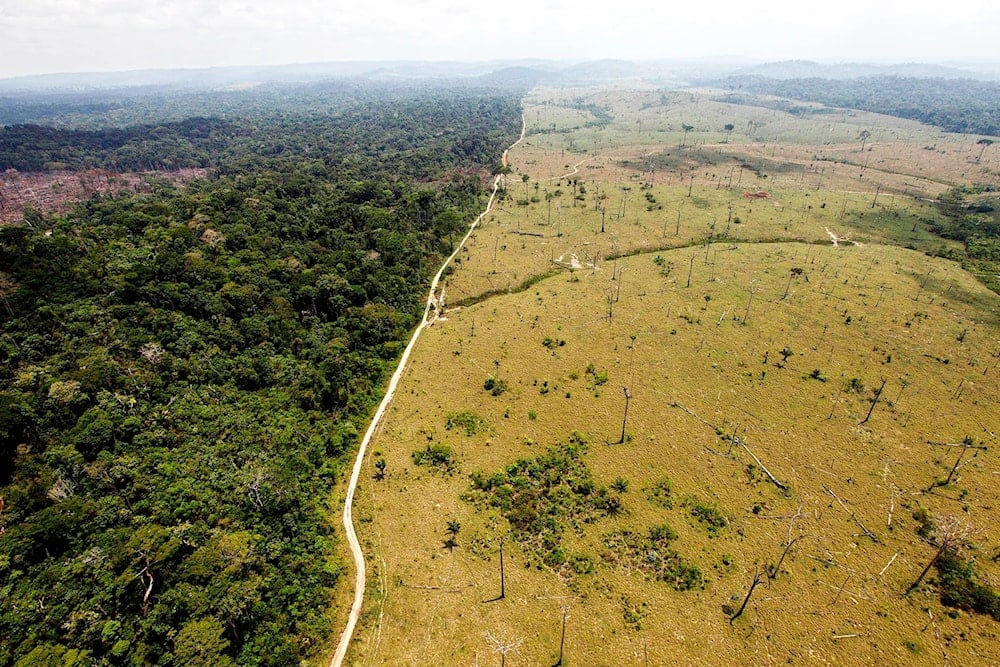How illegal logging fuels global crime, conflict, and corruption
Illegal logging funds terror groups, cartels, and rogue states, according to a recent Foreign Affairs article.
-

A deforested area near Novo Progresso in Brazil's northern state of Para. (Andre Penner/AP)
In The War on Trees, published by Foreign Affairs, Justyna Gudzowska and Laura Ferris argue that illegal logging is not just an environmental crisis but a growing national security threat.
In January 2020, two nature guides dedicated to protecting the monarch butterfly reserve in Michoacan, Mexico, were found dead within days of each other. Both had reportedly spoken out against drug cartels using the forest for illegal logging, according to Foreign Affairs.
Thousands of miles away, in the Democratic Republic of Congo’s Virunga National Park, armed rebel groups make an estimated $28 million annually by turning protected trees into charcoal, what some locals call “black gold.” Over 200 park rangers have been killed in the line of duty.
According to Gudzowska and Ferris, these are not isolated incidents. Around the world, cartels, terrorist groups, and authoritarian regimes exploit forests to finance operations, launder money, and fuel instability.
Yet governments continue to treat environmental crime as a secondary concern. Illegal logging may be a threat to biodiversity, but it is also a pillar of transnational crime that now threatens global security.
Illegal logging is the third most lucrative transnational crime after counterfeiting and narcotics, according to US Customs and Border Protection, says Foreign Affairs said.
Interpol estimates that 15–30% of the global timber trade is illegal. In tropical zones like the Amazon, Southeast Asia, and the Congo Basin, that figure can reach 90%. In Congo, officials admit that nearly all logging is “in some fashion illegal.”
In Virunga and across West Africa, armed groups use logging revenue to fund violence and political disruption. In Central America, cartels raze forests to create cattle ranches used both for drug smuggling routes and as a front for laundering narcotics revenue.
As argued by Gudzowska and Ferris, Al-Shabab in Somalia, ISIS in Mozambique, and al-Qaeda affiliates in Mali have all financed operations through forest exploitation. In Myanmar, timber has helped fund a military junta already sanctioned for human rights abuses.
Dirty timber, clean profits: laundering wood at scale
Wood, like gold, is easily laundered. Criminal actors use tactics like mislabeling species, falsifying origins, and exploiting gaps in customs inspections to pass off illegally harvested timber as legal.
This “timber laundering” allows illicit wood to enter the global supply chain, where it is sold to major retailers and construction firms.
One technique, “double laundering,” uses timber revenues to fund legitimate-seeming investments in sectors like real estate, according to Foreign Affairs.
Meanwhile, enforcement remains weak. Environmental crimes are low-risk and high-reward, with minimal penalties compared to drug or weapons trafficking. Investigations are rare, and financial institutions rarely screen clients for links to deforestation.
How illegal logging weakens global commerce and rule of law
The American Forest & Paper Association estimates that illegal logging depresses global timber prices for legal producers by up to 16%, harming US exporters. Retail giants have already faced scrutiny: Home Depot was linked to 1.2 million doors made with illegal timber from Equatorial Guinea.
IKEA was previously accused of sourcing illegal wood from Ukraine. In 2016, Lumber Liquidators was fined over $13 million for importing hardwoods made from Russian wood via China.
According to Gudzowska and Ferris, financial institutions that fund clients with exposure to illegal timber are at growing risk, yet few conduct proper due diligence.
The US Lacey Act prohibits the import of illegally harvested wood, but compliance is inconsistent. Environmental crime, despite its scale, remains a legal and regulatory afterthought.
China’s role in global timber exploitation
The rise of China as the world’s largest timber importer complicates enforcement. Domestic logging in China is tightly restricted, but its construction and manufacturing sectors source wood globally, often from high-risk regions in Asia, Africa, and Russia.
China is “probably the world’s largest importer of illegal timber,” according to the Environmental Investigation Agency.
Rosewood, in particular, exemplifies the problem. Once prized by Ming-era emperors, rosewood now fuels a $26 billion market in China.
According to Gudzowska and Ferris, after depleting forests across Southeast Asia, traders turned to West Africa, where weak regulation and high corruption enabled a rosewood gold rush. Although a 2022 international ban slowed trade, Chinese importers quickly found substitute species, restarting the cycle.
Policy solutions: from financial intelligence to thematic sanctions
The blueprint to combat illegal logging already exists. Governments must elevate environmental crime to the level of drug trafficking, weapons smuggling, and terror finance. Law enforcement should treat illegal logging as a predicate offense for money laundering and enhance scrutiny of timber-linked transactions.
The private sector must be engaged: banks, shippers, and retailers need clearer guidance and must bolster their due diligence frameworks, according to Foreign Affairs.
International coordination is key. Public-private partnerships should be used to share intelligence across borders and sectors. Financial intelligence units should be empowered to trace illicit financial flows from environmental crime.
Legislatures must toughen laws, increase penalties, and guarantee that logging offenses, regardless of species, carry criminal weight.
One powerful tool remains underutilized: thematic sanctions. Just as the US, EU, and allies have sanctioned actors involved in cybercrime, human rights violations, and narcotics trafficking, they could establish a global sanctions regime targeting the illicit natural resources trade. Such a move would not only disrupt revenue streams but elevate awareness of illegal logging as a destabilizing force in international affairs.
According to Gudzowska and Ferris, until that happens, rogue regimes, criminal networks, and sanctioned entities will continue chopping down the world’s forests, funding instability, laundering profits, and weakening governments with every log felled. Let me know if you’d like a Twitter caption, social media assets, or repackaging for a multimedia brief.

 6 Min Read
6 Min Read








